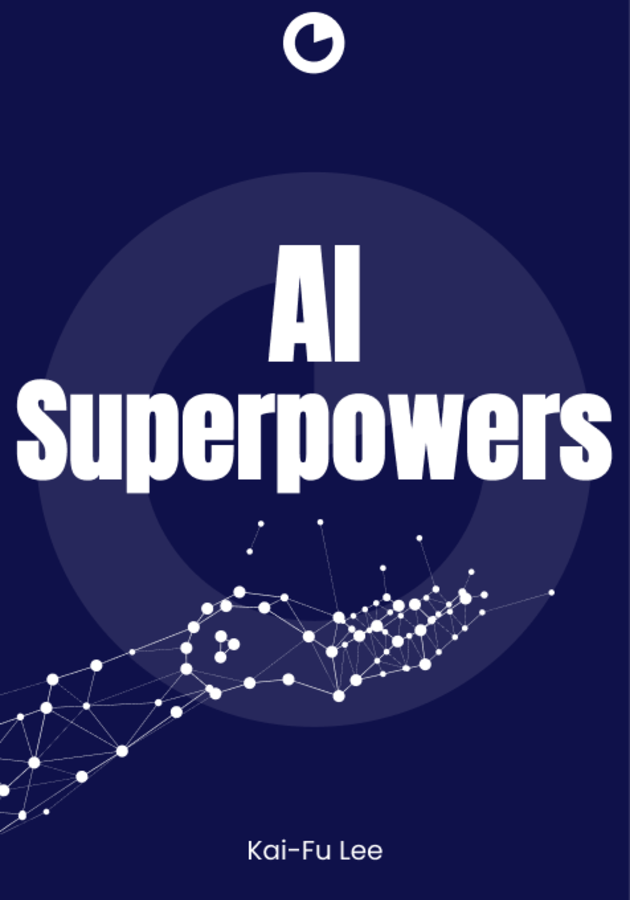It is time to accept that AI technology is already a part of our lives and is here to stay. However, this is not unexpected, considering this kind of technological progress has been anticipated since ancient times. Looking at it from another perspective, it's not so bad. Just imagine how many aspects of our daily lives it has greatly improved. But let's go back to where it all started—in "AI Superpowers: China, Silicon Valley, and the New World Order," author Kai-Fu Lee offers a fascinating, even shocking, exploration of the evolution of artificial intelligence, highlighting the fierce competition between the USA and China. Through engaging anecdotes and insightful analysis, you'll discover how China's relentless drive to become a world power reshapes the world economy and challenges Silicon Valley's dominance. From the rise of Chinese tech giants to personal reflections on AI's impact, this book offers compelling insights into the future of technology and its implications for society.
The swift arrival of AI from science fiction to reality
Until recently, if we heard someone talking about robots that could rival humans in intelligence, we would all agree that it was science fiction and would take several hundred thousand years to become a reality. But looks like the "distant future" that seemed unreal and unattainable to us has arrived earlier than we thought. Thanks to this revolutionary advancement in deep learning, it can be said that we are already on the verge of an AI-driven economy.
It's no longer a secret that all of us are fiercely curious about where this invention will take us and how it will shape our future. It can already be observed in every area of our lives; not only officials and directors in high positions but also children in kindergarten are already aware of the impact of AI technology and are asking questions about whether we will have robots walking on the streets and whether they will replace us in our jobs. Although the rise of artificial intelligence seems like something that happened recently, in fact, it has been developing for decades and only recently became a prominent tool in the business world, thanks to the great interest and undeniable investment of much of the world in becoming more sophisticated.
In the book's first part, the author goes deep into the history of AI and how the original journey into researching this field began. Interestingly, we discover that artificial intelligence was first explored in the 1950s by pioneers such as Marvin Minsky and John McCarthy, who aimed to develop human-like computer intelligence. Initially, there were two main approaches: rule-based artificial intelligence, which involved training machines according to rules, and neural networks, which allowed them to learn from human-like experiences. From here came AI, which led to the emergence of deep learning, whose refutation became evident in 2012 when the AI algorithm was flawless in visual recognition competitions.
Here, the author highlights the extraordinary results of this progress that led to artificial intelligence's ability to recognize patterns, solve complex problems and tasks, recognize voices and sounds, and even drive autonomously.
China's Big Moment in AI
While artificial intelligence was booming in the United States, Canada, and the United Kingdom, China was lagging behind. It wasn't until 2016 that China decided to join the AI scene. Back in 1957, when the Soviet Union launched the first satellite, it prompted the U.S. to act, leading to the creation of NASA and a focus on science and math education. Similarly, in 2016, when AlphaGo beat a top Go player, China took notice.
Go is a complex game, and the showdown between AlphaGo and Lee Sedol attracted millions of Chinese viewers. This event sparked China's tech community, leading to increased funding and support. Eventually, China surpassed the U.S. in AI.
China's approach to innovation differs from that of Silicon Valley. While the Valley dislikes copying, China embraced it. Wang Xing, for example, replicated American websites and improved them for the Chinese market.
Competition in China is intense, driving companies to innovate rapidly. Meituan, inspired by Groupon, expanded its services and became a major success. Meanwhile, Groupon struggled to innovate and sold for much less than expected, while Meituan became one of the world's most valuable startups.
Government support and economic implications
China has its own version of Silicon Valley called Zhongguancun. Although these are two places where technology and innovation thrive equally, the truth is that they actually work in very different ways. In Silicon Valley, companies have minimal influence and let the market take its course. For example, food delivery apps there simply connect users with delivery drivers and let the restaurants handle the rest. In China, however, the complete opposite is happening. There, they prefer to control every aspect from top to bottom. For example, instead of just managing food orders, they own the motorbikes, hire the delivery drivers, and even handle the payments.
This approach, called O2O or online-to-offline, is aimed at stopping copycats from copying their ideas. Here, the author points out one of China's biggest technological successes, the WeChat application. Although it started with the aim of being a social network application, it grew into something bigger. With its help, users can order food, buy everything they need, schedule medical appointments, and even pay anywhere.
With the introduction of WeChat Wallet, a massive revolution in the way of payment has taken place, so it has started to be used massively for payment everywhere. China has so quickly reached a boom in technological inventions because the Chinese government has actively supported startups by providing them with investment subsidies and reduced regulations, investing a staggering $27 billion. This support not only helped China innovate faster than Silicon Valley but also led to severe problems in the economy.
Anticipated advances in medicine and law
One of the most visible aspects of our daily lives where we can clearly notice the impact of artificial intelligence is the recommendations we receive on social networks and Google. It is undeniable that we receive more and more content that corresponds to our preferences and interests, whether it is about products that we need, genres of music and artists that we would like, or even finding a job according to our criteria. With the implementation of this artificial intelligence algorithm, the Internet becomes better in terms of recommendations and more relevant in pleasing our experience as buyers and users.
It is fascinating that the figures show that this rise of artificial intelligence has contributed to more and more people joining the new technology so that even those opposed to being "slaves" to the inventions now choose to buy the latest devices and gadgets precisely because of this. China has a massive advantage over other countries due to its vast user base. The author discovers that the Chinese use the Internet more than the United States and Europe combined and that a much larger proportion use online payments than people in other parts of the world. WeChat Wallet, for instance, allows people to send payments to their favorite online content creators, which fosters more innovation.
As for artificial intelligence in business, the author points out that the US still has a much more significant advantage over China in implementing AI in the business set. The reason for this is apparent; however, AI can extract data from large databases and make a precise and detailed summary to lead to accurate decision-making. Conversely, China doesn't necessarily have a centralized data system and outsources much of its data, making business AI much more difficult.
Since China skipped the credit card revolution and went straight to online payments, they did the same for personal loans. Through WeChat, Smart Finance allows users to make loans without considering their financial history. Instead, the app will access data on your phone, including how quickly you type in your date of birth and how much battery power your device has. The app then makes a lending decision based on millions of other users' data and has proven to be a reliable loan service for migrant workers and other underprivileged populations. Here, Lee states that although the US has a significant advantage over China in business artificial intelligence, he believes China will soon make substantial progress, especially in medicine and law. Today, more and more doctors are becoming overworked and are starting to shift towards using artificial intelligence to help them make more accurate diagnoses, and judges are looking for ways to pass fair sentences.
From smart carts to self-driving cars
In the future, imagine going grocery shopping with a smart cart that knows you so well it feels like it's reading your mind. This cart recognizes you, knows your usual groceries and suggests items you might like based on your preferences. It even keeps track of what's running low in your fridge. And the best part? You don't need to pay at the checkout – it's all automatically deducted from your account.
This innovative shopping experience is made possible by something called Perception AI, which is computers able to understand and recognize things like objects and sounds, just like our brains do. It blurs the lines between online and offline, making our shopping experiences seamless. This advantage might widen as people in the U.S. and Europe become more concerned about privacy, while the Chinese are more willing to trade privacy for convenience. In places like Shenzhen, China, you can already find products like smart speakers, refrigerators, and vacuum cleaners that use Perception AI. China has a head start in this technology thanks to its manufacturing prowess.
Then there's autonomous AI, the next level of smart technology involving robots doing tasks that humans usually do. Think of drones painting houses, fighting fires, or helping in disasters. Self-driving cars are a big part of this, too, and companies like Google and Tesla are leading the way in making them a reality. The U.S. is ahead in autonomous AI, but China is catching up fast. They're even building special roads just for AI vehicles, which could make them just as advanced as the U.S. in the next five years. So, while the U.S. might have a head start, China isn't far behind regarding the future of AI.
AI's bright future and dark potential
Although the book is primarily focused on the fascination surrounding artificial intelligence and its positive impacts on the world today, Lee does not shy away from addressing a slightly darker aspect of this revolutionary progress – the potential for robots to reshape the world and even rebel against humanity, potentially sparking a conflict. While such a scenario may seem like something out of a sci-fi movie, it's not entirely implausible. The author uses irony to hook readers while highlighting the potential consequences of such a scenario. Although a full-scale war or the apocalyptic destruction depicted in movies may not be imminent, the idea that robots could significantly impact the job market is a sobering possibility.
Despite some employers' reluctance to acknowledge it and their belief in the irreplaceability of human labor, some experts argue that artificial intelligence can outperform humans in certain tasks. Lee suggests that rather than being viewed as a threat, integrating artificial intelligence and human labor could enhance efficiency and productivity. In an era where staying ahead of the competition is crucial, forward-thinking businesses recognize the potential benefits of embracing technological advancements.
However, there remains a prevailing notion that human jobs are secure from the threat of artificial intelligence and that industries won't undergo fundamental transformations. While many companies already utilize AI to automate various tasks, experts anticipate its widespread adoption could significantly disrupt markets in the coming decades. Lee acknowledges that while artificial intelligence will undoubtedly bring about substantial changes, these changes won't occur overnight, nor should they evoke fear. The topic continues to be debated, but one thing remains certain: the future remains uncertain.
Rediscovering life's priorities amidst adversity
In the latter half of his book, Lee writes about some of the most significant aspects of his life, recounting how he once measured success by his dedication to work and his sacrifices, including relegating his family to a supporting role. However, his perspective underwent a seismic shift after being diagnosed with stage IV lymphoma, bringing him to the brink of death. In the face of mortality, Lee recognized that nothing equaled the importance of spending time with loved ones and engaging in personal joys such as enjoying life's basic pleasures and pursuing hobbies.
He understood that success, money, and fame paled compared to these fundamental aspects of existence. Lee reflected on the symbiotic relationship between artificial intelligence (AI) and humanity throughout his chemotherapy journey. While he recognizes the significance of technology in his treatment, he emphasizes that it was his loved ones' constant encouragement that eventually carried him through his battle with cancer.
This challenging experience inspired Lee to reconsider his beliefs about hard work and achievement, recognizing the worth of personal connection over career goals and aspirations. He advocates seeing AI as a tool to complement and augment human endeavors rather than supplanting human interaction. Envisioning a future where AI assists doctors in making fast and accurate diagnoses, Lee emphasizes the importance of medical professionals working hand in hand with technology. He thinks that, while artificial intelligence can improve healthcare delivery, compassionate human care is still irreplaceable. Lee also investigates the societal benefits of AI deployment, such as reducing the impact of job displacement and potentially providing humans with more leisure time through reduced work hours. However, he warns that these solutions might have initial expenses and face long-term issues.
The more socialist approach to this problem is through a Universal Basic Income (UBI) in which wealth is redistributed, and each citizen receives a stipend from the government that covers the basic living expenses. While a UBI is good in theory, Lee proposes that we take an even more radical approach. Lee suggests that the government create a social investment stipend. In other words, those who invest their time in care work, community service, and education should be rewarded. This change would change our economically driven economy into a socially-productive one. If these incentives were given, people would be more encouraged to care for an elderly parent or even lead an afterschool program. Lee argues that this system would reinforce the values we should focus on compassion.
Final notes
The potential of artificial intelligence has been recognized since the last century, and now we have the privilege of living in an era where it is a tangible reality before our eyes. What initially began with skepticism in Western countries has led to a revolution in how we approach everyday life, particularly in enhancing efficiency. This progress owes much to the support the Chinese government provides to startup companies and their endeavors in innovation.
It's no secret that humanity is worried about how this breakthrough will affect the economic landscape. As artificial intelligence progresses, it will unavoidably threaten conventional employment functions. However, by shifting our perspective to one that is open-minded and accepting, we may capitalize on the potential of this advancement for positive change, thereby making our world a better place.
12min tip
Rediscover the wisdom of stashing away advice from high school with Cary Siegel's "Why Didn't They Teach Me This in School?", 99 life-changing money management principles for young adults.





























